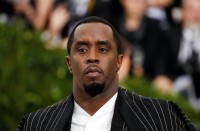
MAY 7 (Reuters) — Popular South Korean boy band Big Bang returns to the music scene after a three-year hiatus with a new single called “Loser”, which explores the stresses of daily life.
The track has dominated South Korea’s online music charts since its release on May 1 and has also ranked top on the iTunes Single Charts of Hong Kong, Macau, Singapore and Taiwan – markets where the band has many fans.
The quintet had taken time off as the group’s members focused on solo careers. Now Big Bang plans to release one single a month until August, culminating with the launch of a new album in September.
When asked about the message behind “Loser”, band member Taeyang told Reuters: “Society is very competitive. I think the word ‘loser’ can explain many problems stemming from competition and many people are struggling to survive. It is comforting that we are singing on their behalf.”
While Korean pop, known as K-pop, tends to project a wholesome image to its fans, the industry has faced criticized for its cut-throat competition and the way it treats young talent. Complaints include excessively long hours and low pay until bands become successful.
Big Bang’s members said they thought the Korean music industry was going through a transition to overcome these unsavory aspects.
“Many places do training that almost churns out the same people. I think eventually that problem will stand out. I believe music must show our individual identities,” said Taeyang.
The “Korean Wave” of music has gained ground in Asia, winning fans from Tokyo to Singapore and beyond, but it has had limited impact in Europe and the United States – with the exception of Psy’s viral hit “Gangnam Style” in 2012.
Big Bang, which lead singer G-Dragon says can make further inroads into West, is known for being heavily involved in the production of their records, as opposed to other K-pop groups which are famous for their slick dance routines.
G-Dragon also admitted that his fashion style is often more globally scrutinized than his music, but he said he will continue his music work.
“Songs, performances and fashion are all tools to explain my music. I don’t know how it happened, but it’s true,” he explained.
The band is managed by YG Entertainment Inc, one of South Korea’s three main K-pop talent agencies whose acts include Psy. It has a market value of $637 million.
YG said last year that the private equity arm of French luxury goods giant LVMH would invest up to $80 million in the firm. (Seoul, South Korea)








